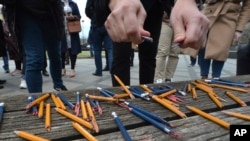Bosnia's autonomous Serb Republic has moved towards criminalizing acts of defamation and insult despite international criticism and protests by journalists who see the new law as a crackdown on free speech.
The regional parliament on Thursday passed draft amendments to the criminal code introducing fines of 3,000 to 60,000 euros ($3,200-$65,000) for damaging a person's honor or reputation and for publishing damaging videos, photos or documents without consent.
The legislation has prompted a public outcry since it was announced in early March, with journalists, civil society activists and diplomats saying it aimed to silence independent media.
The United Nations, the European Union and the Organization for Security and Cooperation in Europe have all called on the Serb Republic to drop the criminal code changes and ensure the full protection of media freedom as a necessary precondition for Bosnia to progress on the EU path.
Bosnia was the first country in the Western Balkans region that de-criminalized defamation in 2001. Under provisions of the 1995 U.S.-brokered Daytron peace deal that ended a war there, Bosnia is split into the Bosniak-Croat Federation and the Serb Republic.
"News reporting will become a mission impossible, investigative journalism will cease to exist and all citizens will feel effects on their own skin," Sinisa Vukelic, the president of the Banja Luka Journalists Club, said last week at a protest during which reporters symbolically taped their mouths.
The law was proposed by the ruling Alliance of Independent Social Democrats headed by Serb secessionist leader Milorad Dodik, the Serb Republic president, and agreed by their coalition partners with whom they form a parliamentary majority.
After some journalists criticized the draft law as repressive over the past week, Dodik publicly lashed out at them. Following his remarks, the cars belonging to two journalists who publicly criticized the law were damaged in Banja Luka.
Dodik this week dismissed criticism that journalists will be targets under the planned legislation, saying a draft law may be improved during a public discussion that will follow before it comes into effect.
He said a prison term for offenders was not introduced in the law even though those who cannot pay the fine will have to serve a jail term.





